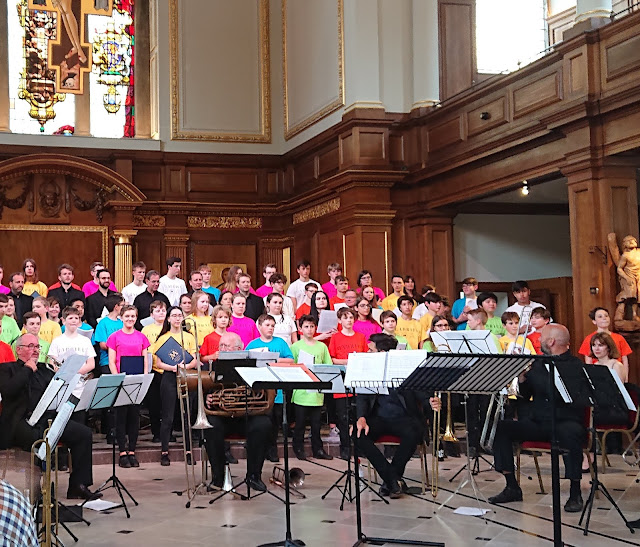 |
| Gabrieli Roar (with children from Tiffin Boys Choir & DRET Youth Choir), Gabrieli Consort & Players St Andrew's Church, Holborn |
It isn't just music as an academic subject, with the cuts in funding for education and the down-grading of music's role in the syllabus it is tempting to think that we are on the way to all forms of music in education being the preserve only of the privileged or dependent on external projects. There is lots of good work being done by musical organisations, something touched on in my recent my interviews with Nicholas Chalmers of Nevill Holt Opera and Christopher Monk of the Armonico Consort and my article about the recent Gabrieli Roar project. But the result is a patchwork of practical music provision, rather than a coherent musical policy.
Ironically, this comes at a time when we are beginning to understand quite what a valuable tool music can be in education, improving not only social cohesion but academic skills as well.
Some years ago, I was at an In Harmony Lambeth event when Julian Lloyd Webber was talking, and he commented that as a musical project In Harmony Lambeth could only be seen as expensive but as a social action project it could be seen as providing wonderful value for money. Founded 10 years ago this year, In Harmony Lambeth was inspired by the Venezualan El Sistema. The Venezualan organisation has become controversial in recent years, but there is no doubting that those organisations in the UK that follow El Sistema, the system, have a remarkable effect on improving children's ability to work as a team; confidence, pride and aspiration; resilience; social skills; leadership skills; self-esteem; as well as allowing them to discover the sheer joy of music making. Currently Sistema England supports six such projects, In Harmony Lambeth, In Harmony Liverpool, In Harmony Newcastle, In Harmony Telford & Stoke, Sistema in Norwich, the Nucleo Project.
 |
| Nevill Holt Opera education workshop with Nicholas Chalmers |
But what is remarkable is the effect that music can have on schools. The Singing Schools programme devised by the Voices Foundation in collaboration with the David Ross Educational Trust (DRET) won an award at the 2018 Music Teachers Awards for Excellence. A number of DRET's Primary Academies were put on the programme, which helps staff deliver a singing-based music curriculum in which every child and every adult sings daily with repertoire ranging from simple catchy melodies to complex part songs. The results had a transformational effect, not just on the children's musical abilities but on the general education (the winning entry in the competition had seen an increase in Year 6 SATs results from 31% combined - reading, writing and maths - to 64% combined).
All this seems to be born out by recent research (see the article in iNews). Canadian researchers have been examining school records in British Colombia, and after studying 112,000 students found that music students were the equivalent of an academic year better in maths, science and English than their non-musical classmates. The suggestion is that skills learned in music classes enhanced the students' overall education. (you can read more about the research in an invaluable article on The Conversation written by one of the researchers).
'Music may not make you smarter, but we now know that music engagement sustained from childhood into adolescence — and more of it, especially instrumental music — may lead to doing better in high school.' (Scott Emerson in The Conversation)
This is completely counter to the current way of thinking in the Government and the Department for Education where music seems to be regarded as a luxury that we can ill afford. Yet projects such as these, and the Canadian research simply confirm what many experience music educationalists have known all along, that music as part of a well rounded education is the most important.



.jpg)






%20Craig%20Fuller.jpg)
No comments:
Post a Comment